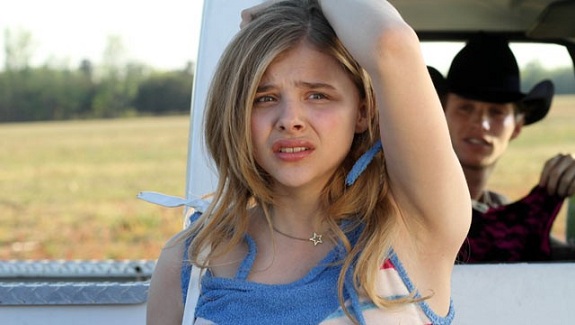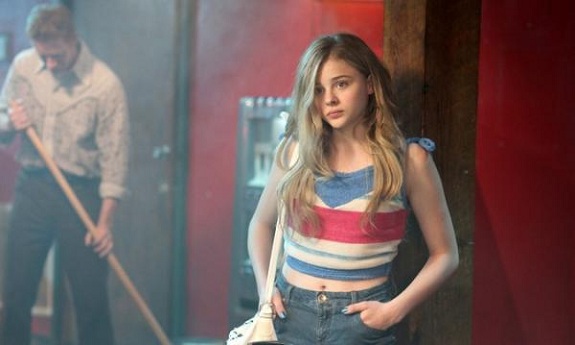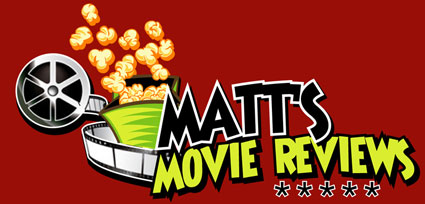With his feature film the independent comedy/drama Lymelife a critical success, director Derick Martini was touted as a filmmaker to watch, receiving a “Breakthrough Director” nomination at the 2009 Gotham Awards and praise from cinema legend Martin Scorsese.
Faced with the challenge of following on his previous film, Martini has defied expectations and released Hick, a dark comedy based on the semi-autobiographical novel by Andrea Potts that stars Chloe Grace-Moretz as a runaway teen who falls into the company of the wrong people.
With Hick released in Australia on DVD/Blu-ray, Matt’s Movie Reviews spoke to Martini about making Hick, working with Chloe Grace-Moretz, his relationship with Martin Scorsese and much more.
Enjoy!
The author of Hick, Andrea Potts, sought you to direct her screenplay. Did you read her novel beforehand or was that the first time you came across her story?
No. They had sent my agent the novel and the screenplay at the same time, so Andrea had already written her own adaptation of it. So I read the script first and then I read the novel afterwards.
The material has a certain amount of risk to it. The central character is a 13 year old runaway…
I think a certain amount of risk is putting it very lightly! I say it’s a tremendously risky movie.
Well was there ever a time you thought “I’m not touching this with a 10 foot pole!”?
Absolutely! Quite frankly I passed on the movie three times.
What was it about the script that made you come back to it every time?
Well, first of all it wasn’t about the material being bad. The material was compelling. I couldn’t put it down. I couldn’t put down the screenplay. I thought Andrea did a great job and I’m a screenwriter, so I was reading her screenplay and thinking “Well, this is a great screenplay for someone else to direct.”
Then I read her book and thought “This is a great book”. It just went to some very, very dark places and this is my second time directing and my first time directing was Lymelife, which was a film I wrote. So this was to me….a) I didn’t write it, and b) it went to some very dark places and it was a very risky move on my part to commit to the movie.
So I passed. It happens. Her and the producer were pretty aggressive about getting me on board, and I wasn’t interested because, again your second movie is pretty important and again, sure as you know with filmmakers you really need to think about what story you want to tell next.
So I went through a real process of coming to a decision and it really had to do with I’m 36 years old, I have two daughters one of them is 3 and one of the is 1, and I thought the material was great and the actors I was thinking of in those roles I thought wold be really great to work with, and I believed it was a story that should be told.
But I just kept thinking “What are my daughters going to think when they’re older and they see this movie?” That was the thing that kept holding me back and then I gave the script to my wife and said “Well, I don’t think I am going to do this movie. They’re getting close to getting it made and I think I should do something different because I don’t know what the kids are going to say 15 years from now.”
She read it and after she read it she said: “I think you’re wrong. I think that you should do this movie because a whole lot of young girls who come from poor backgrounds and have shit parents wind up in these situations. It’s a story that really should be out there because it’s a cautionary tale.”
When I started to look at it that way, I stared to feel more confident and started to feel like there was more of a concrete reason to tell this story. Then when I talked to the author about the screenplay, she just said to me that….I told her what my concerns were and the book is even darker…she said “Look, this stuff happened to me. This happened to other friends of mine and it’s not something that was once in a blue moon thing. It happened all the time.”
After talking to her and talking to my wife, I realised this is something that happened all the time and started to see it as a cautionary tale and as something of a warning to young girls who were from broken homes, who feel like they are going to escape by running away and hitchhiking, when chances are mostly likely you’re gonna get in the wrong fucking car! That’s the likelihood of it, so in my opinion it became more of a cautionary tale at its core. Also there are other things, but that’s the main reason I made it.
 |
"I started to see it as a cautionary tale and as something of a warning to young girls who were from broken homes, who feel like they are going to escape by running away and hitchhiking, when chances are mostly likely you’re gonna get in the wrong f****g car!" - Derick Martini |
Chloe Grace Moretz plays the part of Luli. Her past roles have shown a level of fearlessness on her part. Was that key aspect to her being cast in this film?
Well I only saw a little clip before I cast her. My casting director showed me a 5 minute scene from Kick-Ass, which was the scene where Nic Cage shoots her and it turns out she’s wearing the bulletproof vest. It was a great scene and then when I met her and I was actually sitting across from her, we were talking about making this large choice and taking on this endeavour together…she was definitely fearless about it.
She’s very brave, very smart and she’s way beyond her years as a person for her age. Most of the time when I’m talking to an actor about doing a part…if the actor doesn’t think that they can do it, then most likely I’ll be able to tell and they will not do the role because they don’t think they can do it.
She has all the confidence in the world in herself, and therefore I had all the confidence in the world in her. You know it was a big deal for her, carrying her first movie at 14 and I had a similar experience with Rory Caulkin when he was 15. He was a boy when he was in Lymelife and he had to carry the movie, and I remember having a similar conversation with him which was: “This movie is told from your point of view. That means it’s on your shoulders. Are you prepared?”
I felt the same way about Chloe as I did about Rory, which was yes, she was prepared, she was brave and she was ready to take it on and tackle it, and she did.
Chloe has reached her teen years and historically that has proven to be a difficult time for child actors. However her prolific output proves she is handling this part of her life very well. How do you foresee her future in the industry?
I think Chloe is a gifted talent and she’s a gifted actress or actor, performer…but she’s also very smart. She’s got a very smart team around her and when I say “team”, I mean family. Her brother Trevor is heavily involved in working with her. He’s her de facto acting coach, I guess you could call and essentially her producer.
They’re very protective of her and the idea of her preserving her innocence as much as they can. For any kid who is growing up you want to preserve their innocence as long as you can, but I think that she’ll remain the same Chloe that she is today, except she’ll just be 24 instead of 14 and she’ll still be a wonderful and marvellous actress and probably be producing and directing and acting as well, because I think when someone is as gifted as she is, it goes beyond just being able to deliver a great performance.
I think she can be as prolific and multi-faceted as Jodie Foster, and that’s what I see for her.
I loved the photography by your DP Frank Goodwin, especially the shots of rural southern America. This is the second time you’ve worked with Frank. Could you describe how you two approached Hick from a photography point of view?
Well Frankie and I did Lymelife together, and when this came up for me there was no other option other than to work with Frank again. We both like to shoot on film, not on digital. We both like to shoot with anamorphic lenses and the collaboration makes our lives easier because I do very thorough shot lists. I don’t do storyboards, I do shot lists which are different.
I just do a draft of the script where I’ll do my directors draft which lists every single shot in the script, within the scenes, when the camera’s going to move, when it’s not going to move, when we’re going to use the 48 frames per second, when we’re going to… everything you could imagine!
It’s basically my wish list as a director, and it’s very detailed and very organised. I’ll give him that draft and he’ll read that draft and then he’ll come back to me and say: “Ok. Well I think this is do-able, and this is reasonable, what if we did this, what if we did that, what if we combine this and that…”
So we work on it beforehand, we work on it in prep and even before prep so by the time we’re scouting locations my first AD Michael Jefferson– another guy who came with me from Lymelife – he has my shot list and he knows exactly what I want and Frank wants, and our job then is to fight like mad to get them, meaning to fight time because there is only so many hours during the day and this is a more ambitious movie shot wise then Lymelife.
So we knew we had to get up every day, go in and fight to get our shots and fight to get these great, big shots on a low budget and I think we did that. I’m really happy with my collaboration with Frank, because I think he is a great cinematographer and we have a shorthand. A lot of directors walk onto a set and they don’t have a shot list, they’ve discussed philosophical things with their DP and maybe they’ve watched a couple of movies together for references, which Frank and I do. We always reference a movie or two when we’re working, but maybe they’ve done that but they haven’t really gone through the shot list.
What I love about Frank is that he understands that I don’t like to move the camera unless it’s motivated. He’s on the same page with me. He doesn’t like unmotivated moves. It becomes show off-y, and neither of us like that. We want to tell a story and we want the performances and the actors to stand out more than what I’m doing behind the camera or what Frank is doing with his lenses. It’s pretty simple philosophy that we share and I’m glad that we share it because we work really well together. We get the job done.
 |
"She’s very brave, very smart and she’s way beyond her years as a person for her age." - Derick Martini |
With Lymelife being such an enormous critical success, was there pressure to live up to a certain expectations with your second feature?
Yeah, there were a lot of expectations. Lymelife in 2009 premiered at Toronto and it won the critics prize and then won all kinds of other rewards, and it was really well regarded. So two years later in 2011 Hick premieres in Toronto and I think the first audience that saw it was expecting another Lymelife, but it couldn’t be any more different.
That is part of it…I can’t keep making Lymelife over and over again. (laughs) Maybe I could but I think people will get a bit bored of it, and I wold get a little bored so, again, this is an opportunity for me to do something that wasn’t necessarily…you wouldn’t just assume that I would make this movie after you saw Lymelife. Some people thought I would make something lighter and I didn’t.
Martin Scorsese was a producer on Lymelife. Alec Baldwin – who also stars in Hick - once described him as your “rabbi.” Describe his influence on you and your relationship with him?
Well, I think his influence is the same with me as it is with many young filmmakers. If you look at his movies you don’t really have to necessarily consult with him on a regular basis. You see the way that he pushes it with his stories and with the performances and if you have the privilege of watching what he does, then you learn from that and on Lymelife he was tremendously supportive. He wasn’t on the set, he was making Shutter Island and he’ll look at dailies, and he would talk about the use of anamorphic lenses, and he was surprised that I was making my days with a short shoot and you know…he’s more of a priest than a rabbi! (laughs) I’m not Jewish so he’s more a priest that a rabbi. He does all of my confessions. He’s on the other side of the confessional both when I say “Forgive me father for I have sinned. I didn’t get all of the shots that I wanted today”. (laughs)
Scorsese has famously moved onto digital. You yourself use film…
I have not had that discussion with him and I don’t plan on bringing it up with him, because I don’t really think that…I don’t agree with him on it, and I have no intent on having an argument with him about it. (laughs) So for me I don’t know why he is going digital. I’m sure he has his reasons. We have not discussed it I haven’t heard anything from him about it, but I am not going digital.
I like to shot on anamorphic lenses and I like to shoot on film. Look, I can’t speak for him. I don’t know why he’s shooting on digital. There must be a reason that it works for him through the story he’s telling. Otherwise he wouldn’t do it just to do it, because film is film. There is a reason why the lights go down and that screen goes up and we are sit there for 120 minutes or whatever it is and watch this story unfold on film.
Digital, I think, is a way to be lazy. You’re shooting on a chip, which means you can keep rolling and rolling and rolling, and the pressure of having to shoot on film is part of the magic, you know? We thrive under pressure.
I think part of the reason why I love film is not only the look, because I still don’t think they have accomplished making digital look like film, because there never will be able to because film is chemicals. It’s different. They are never going to be able complete ape the look. Why would I want a look that’s aped anyway, rather than the real.
The other reason is that there’s a pressure. There’s a time pressure in film. Film is a burden, but it’s beautiful. That burden puts pressure on you today. Puts pressure on you to have to combine shots and become more creative on the spot and force you to use your creativity, as opposed to just let the camera and we’ll fix it in post. That’s what you don’t want to hear on set is “we’ll fix it post”, because then every day you start to say “Well, we could make mistakes every day and screw up every day and we’ll just fix it in post”.
I’m not there yet psychologically, so that’s how I feel about it.
|
